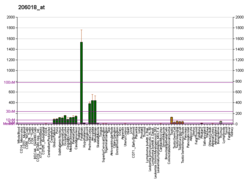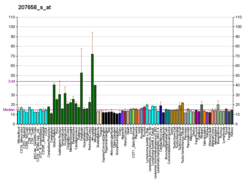FOXG1
Forkhead box protein G1 is a protein that in humans is encoded by the FOXG1 gene.[5][6][7]
Function
[edit]This gene belongs to the forkhead family of transcription factors that is characterized by a distinct forkhead domain. The complete function of this gene has not yet been determined; however, it has been shown to play a role in the development of the brain and telencephalon. Mutations of FOXG1 are the cause of FoxG1 syndrome.[8]
FOXG1 syndrome
[edit]FoxG1 syndrome is characterized by microcephaly and brain malformations. It affects most aspects of development and can cause seizures. FOXG1 syndrome is classified as an autism spectrum disorder and was previously considered a variant of Rett syndrome.[9][10]
Interactions
[edit]FOXG1 has been shown to interact with JARID1B.[11]
See also
[edit]References
[edit]- ^ a b c GRCh38: Ensembl release 89: ENSG00000176165 – Ensembl, May 2017
- ^ a b c GRCm38: Ensembl release 89: ENSMUSG00000020950 – Ensembl, May 2017
- ^ "Human PubMed Reference:". National Center for Biotechnology Information, U.S. National Library of Medicine.
- ^ "Mouse PubMed Reference:". National Center for Biotechnology Information, U.S. National Library of Medicine.
- ^ Murphy DB, Wiese S, Burfeind P, Schmundt D, Mattei MG, Schulz-Schaeffer W, Thies U (Nov 1994). "Human brain factor 1, a new member of the fork head gene family". Genomics. 21 (3): 551–7. doi:10.1006/geno.1994.1313. PMID 7959731.
- ^ Bredenkamp N, Seoighe C, Illing N (Feb 2007). "Comparative evolutionary analysis of the FoxG1 transcription factor from diverse vertebrates identifies conserved recognition sites for microRNA regulation". Dev Genes Evol. 217 (3): 227–33. doi:10.1007/s00427-006-0128-x. PMID 17260156. S2CID 20867411.
- ^ "Entrez Gene: FOXG1B forkhead box G1B".
- ^ Ariani F, Hayek G, Rondinella D, Artuso R, Mencarelli MA, Spanhol-Rosseto A, Pollazzon M, Buoni S, Spiga O, Ricciardi S, Meloni I, Longo I, Mari F, Broccoli V, Zappella M, Renieri A (2008). "FOXG1 is responsible for the congenital variant of Rett syndrome". Am. J. Hum. Genet. 83 (1): 89–93. doi:10.1016/j.ajhg.2008.05.015. PMC 2443837. PMID 18571142.
- ^ "FOXG1 syndrome".
- ^ "FOXG1 Syndrome: More than a congenital variant of Rett Syndrome? | the University of Chicago Genetic Services".
- ^ Tan K, Shaw AL, Madsen B, Jensen K, Taylor-Papadimitriou J, Freemont PS (Jun 2003). "Human PLU-1 Has transcriptional repression properties and interacts with the developmental transcription factors BF-1 and PAX9". J. Biol. Chem. 278 (23): 20507–13. doi:10.1074/jbc.M301994200. PMID 12657635.
Further reading
[edit]- Li J, Chang HW, Lai E, Parker EJ, Vogt PK (1995). "The oncogene qin codes for a transcriptional repressor". Cancer Res. 55 (23): 5540–4. PMID 7585630.
- Wiese S, Murphy DB, Schlung A, Burfeind P, Schmundt D, Schnülle V, Mattei MG, Thies U (1995). "The genes for human brain factor 1 and 2, members of the fork head gene family, are clustered on chromosome 14q". Biochim. Biophys. Acta. 1262 (2–3): 105–12. doi:10.1016/0167-4781(95)00059-p. PMID 7599184.
- Pierrou S, Hellqvist M, Samuelsson L, Enerbäck S, Carlsson P (1994). "Cloning and characterization of seven human forkhead proteins: binding site specificity and DNA bending". EMBO J. 13 (20): 5002–12. doi:10.1002/j.1460-2075.1994.tb06827.x. PMC 395442. PMID 7957066.
- Li J, Vogt PK (1993). "The retroviral oncogene qin belongs to the transcription factor family that includes the homeotic gene fork head". Proc. Natl. Acad. Sci. U.S.A. 90 (10): 4490–4. Bibcode:1993PNAS...90.4490L. doi:10.1073/pnas.90.10.4490. PMC 46537. PMID 8099441.
- Kastury K, Li J, Druck T, Su H, Vogt PK, Croce CM, Huebner K (1994). "The human homologue of the retroviral oncogene qin maps to chromosome 14q13". Proc. Natl. Acad. Sci. U.S.A. 91 (9): 3616–8. Bibcode:1994PNAS...91.3616K. doi:10.1073/pnas.91.9.3616. PMC 43631. PMID 8170957.
- Huh S, Hatini V, Marcus RC, Li SC, Lai E (1999). "Dorsal-ventral patterning defects in the eye of BF-1-deficient mice associated with a restricted loss of shh expression". Dev. Biol. 211 (1): 53–63. doi:10.1006/dbio.1999.9303. PMID 10373304.
- Dou CL, Li S, Lai E (1999). "Dual role of brain factor-1 in regulating growth and patterning of the cerebral hemispheres". Cereb. Cortex. 9 (6): 543–50. doi:10.1093/cercor/9.6.543. PMID 10498272.
- Dou C, Lee J, Liu B, Liu F, Massague J, Xuan S, Lai E (2000). "BF-1 Interferes with Transforming Growth Factor β Signaling by Associating with Smad Partners". Mol. Cell. Biol. 20 (17): 6201–11. doi:10.1128/MCB.20.17.6201-6211.2000. PMC 86095. PMID 10938097.
- Yao J, Lai E, Stifani S (2001). "The Winged-Helix Protein Brain Factor 1 Interacts with Groucho and Hes Proteins To Repress Transcription". Mol. Cell. Biol. 21 (6): 1962–72. doi:10.1128/MCB.21.6.1962-1972.2001. PMC 86788. PMID 11238932.
- Rodriguez C, Huang LJ, Son JK, McKee A, Xiao Z, Lodish HF (2001). "Functional cloning of the proto-oncogene brain factor-1 (BF-1) as a Smad-binding antagonist of transforming growth factor-beta signaling". J. Biol. Chem. 276 (32): 30224–30. doi:10.1074/jbc.M102759200. PMID 11387330.
- Tan K, Shaw AL, Madsen B, Jensen K, Taylor-Papadimitriou J, Freemont PS (2003). "Human PLU-1 Has transcriptional repression properties and interacts with the developmental transcription factors BF-1 and PAX9". J. Biol. Chem. 278 (23): 20507–13. doi:10.1074/jbc.M301994200. PMID 12657635.
- Seoane J, Le HV, Shen L, Anderson SA, Massagué J (2004). "Integration of Smad and forkhead pathways in the control of neuroepithelial and glioblastoma cell proliferation". Cell. 117 (2): 211–23. doi:10.1016/S0092-8674(04)00298-3. PMID 15084259.
- Shoichet SA, Kunde SA, Viertel P, Schell-Apacik C, von Voss H, Tommerup N, Ropers HH, Kalscheuer VM (2005). "Haploinsufficiency of novel FOXG1B variants in a patient with severe mental retardation, brain malformations and microcephaly". Hum. Genet. 117 (6): 536–44. doi:10.1007/s00439-005-1310-3. PMID 16133170. S2CID 2819134.
External links
[edit]- International FoxG1 Foundation Information for FOXG1 families
- FOXG1 Research Foundation Info on FOXG1 syndrome
- The Children's Rare Disorders Fund Info on FOXG1 syndrome
- FOXG1B+protein,+human at the U.S. National Library of Medicine Medical Subject Headings (MeSH)
This article incorporates text from the United States National Library of Medicine, which is in the public domain.






